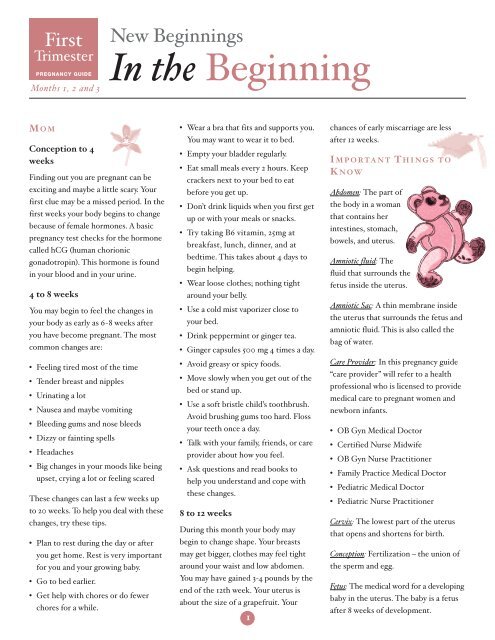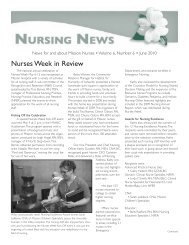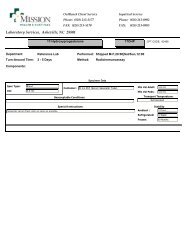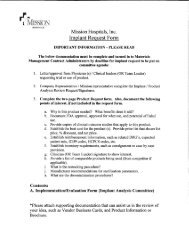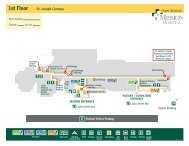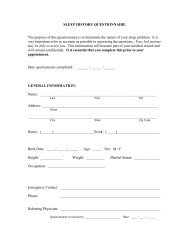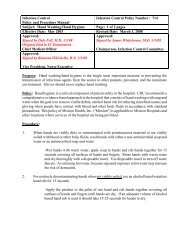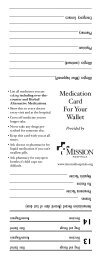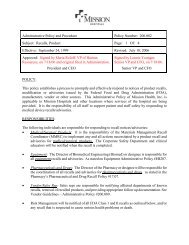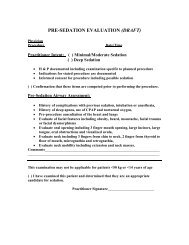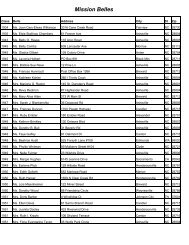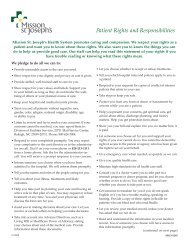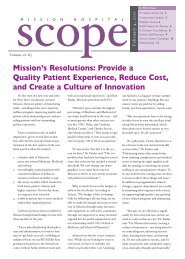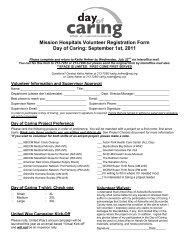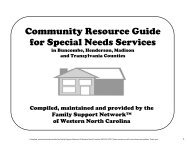New Beginnings: Pregnancy Guides - Mission Health
New Beginnings: Pregnancy Guides - Mission Health
New Beginnings: Pregnancy Guides - Mission Health
Create successful ePaper yourself
Turn your PDF publications into a flip-book with our unique Google optimized e-Paper software.
First<br />
Trimester<br />
PREGNANCY GUIDE<br />
Months 1, 2 and 3<br />
<strong>New</strong> <strong>Beginnings</strong><br />
In the Beginning<br />
M OM<br />
Conception to 4<br />
weeks<br />
Finding out you are pregnant can be<br />
exciting and maybe a little scary. Your<br />
first clue may be a missed period. In the<br />
first weeks your body begins to change<br />
because of female hormones. A basic<br />
pregnancy test checks for the hormone<br />
called hCG (human chorionic<br />
gonadotropin). This hormone is found<br />
in your blood and in your urine.<br />
4 to 8 weeks<br />
You may begin to feel the changes in<br />
your body as early as 6-8 weeks after<br />
you have become pregnant. The most<br />
common changes are:<br />
• Feeling tired most of the time<br />
• Tender breast and nipples<br />
• Urinating a lot<br />
• Nausea and maybe vomiting<br />
• Bleeding gums and nose bleeds<br />
• Dizzy or fainting spells<br />
• Headaches<br />
• Big changes in your moods like being<br />
upset, crying a lot or feeling scared<br />
These changes can last a few weeks up<br />
to 20 weeks. To help you deal with these<br />
changes, try these tips.<br />
• Plan to rest during the day or after<br />
you get home. Rest is very important<br />
for you and your growing baby.<br />
• Go to bed earlier.<br />
• Get help with chores or do fewer<br />
chores for a while.<br />
• Wear a bra that fits and supports you.<br />
You may want to wear it to bed.<br />
• Empty your bladder regularly.<br />
• Eat small meals every 2 hours. Keep<br />
crackers next to your bed to eat<br />
before you get up.<br />
• Don’t drink liquids when you first get<br />
up or with your meals or snacks.<br />
• Try taking B6 vitamin, 25mg at<br />
breakfast, lunch, dinner, and at<br />
bedtime. This takes about 4 days to<br />
begin helping.<br />
• Wear loose clothes; nothing tight<br />
around your belly.<br />
• Use a cold mist vaporizer close to<br />
your bed.<br />
• Drink peppermint or ginger tea.<br />
• Ginger capsules 500 mg 4 times a day.<br />
• Avoid greasy or spicy foods.<br />
• Move slowly when you get out of the<br />
bed or stand up.<br />
• Use a soft bristle child’s toothbrush.<br />
Avoid brushing gums too hard. Floss<br />
your teeth once a day.<br />
• Talk with your family, friends, or care<br />
provider about how you feel.<br />
• Ask questions and read books to<br />
help you understand and cope with<br />
these changes.<br />
8 to 12 weeks<br />
During this month your body may<br />
begin to change shape. Your breasts<br />
may get bigger, clothes may feel tight<br />
around your waist and low abdomen.<br />
You may have gained 3-4 pounds by the<br />
end of the 12th week. Your uterus is<br />
about the size of a grapefruit. Your<br />
1<br />
chances of early miscarriage are less<br />
after 12 weeks.<br />
I MPORTANT T HINGS TO<br />
K NOW<br />
Abdomen: The part of<br />
the body in a woman<br />
that contains her<br />
intestines, stomach,<br />
bowels, and uterus.<br />
Amniotic fluid: The<br />
fluid that surrounds the<br />
fetus inside the uterus.<br />
Amniotic Sac: A thin membrane inside<br />
the uterus that surrounds the fetus and<br />
amniotic fluid. This is also called the<br />
bag of water.<br />
Care Provider: In this pregnancy guide<br />
“care provider” will refer to a health<br />
professional who is licensed to provide<br />
medical care to pregnant women and<br />
newborn infants.<br />
• OB Gyn Medical Doctor<br />
• Certified Nurse Midwife<br />
• OB Gyn Nurse Practitioner<br />
• Family Practice Medical Doctor<br />
• Pediatric Medical Doctor<br />
• Pediatric Nurse Practitioner<br />
Cervix: The lowest part of the uterus<br />
that opens and shortens for birth.<br />
Conception: Fertilization – the union of<br />
the sperm and egg.<br />
Fetus: The medical word for a developing<br />
baby in the uterus. The baby is a fetus<br />
after 8 weeks of development.


